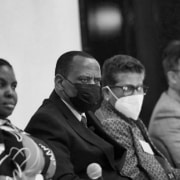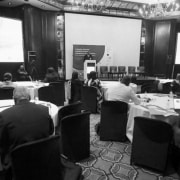|
Getting your Trinity Audio player ready...
|
Gathering a diverse group of people in one room to talk about a common cause is a good first step, no matter the cause. The next step is acting on the points raised and the discussions held – not quite as easy or simple.
This is the task before the organisers and attendees of last week’s successful two-day conference titled Collective action for beneficial ownership transparency (BOT) in South Africa: From commitment to implementation.
Organised by Corruption Watch, the Department of Public Service and Administration (DPSA), the Financial Intelligence Centre, the Open Government Partnership, and Open Ownership, the conference aimed to explore ways of achieving beneficial ownership transparency. Taking place on 16 and 17 May, the event brought together civil society organisations, government representatives, and the private sector to share progress to date, collectively discuss and determine how international best practice can be applied to South Africa, and define the collaborative role of each sector in putting South Africa’s various BOT commitments into action.
Issues raised during the conference include:
- Who has access to the information? Should the register be public? What information should be included in the public register, and how do we protect personal information?
- Collecting BOT information accurately and in real time is crucial.
- Adopting a risk-based approach on BOT, flagging companies that are owned by other companies located in secrecy and tax haven jurisdictions.
- Ease of doing business – how do we reduce the red tape and make it administratively simpler to comply with the Financial Action Task Force’s (FATF) BOT information? Doing do will reduce the cost of beneficial ownership, transparency, and compliance, and will improve the quality of information that is available.
- How do we address procurement issues such as capacity?
- Capturing the right information – the identity of the ultimate beneficial owner.
The added pressure of developing measures to address the deficiencies brought up in the recent FATF mutual evaluation report, by the deadline of October 2022, complicates the situation – and this is most likely to be the focus for the next few months.
Released in October 2021, the report found that, while South Africa has a solid legal framework to fight money laundering and terrorist and proliferation financing, it has “significant shortcomings implementing an effective system, including a failure to pursue serious cases, especially those linked to so-called ‘state capture’.”
In other words, big on plans and scarce on implementation. The country was given a year to rectify those significant shortcomings in its anti-money laundering, counter financing of terrorism and counter financing of proliferation of weapons of mass destruction systems.
Getting this right will be a boost to BOT plans, as opacity in the true ownership of companies allows criminals to use those entities to move money and other proceeds of crime around the world. The FATF noted that South Africa still must address significant money laundering risks in terms of beneficial owners of legal persons and trusts, cross-border movement of cash, and higher risks such as laundering related to corruption, narcotics, and tax offenses.
Once that is taken care of, the work must begin to put a BO registry in place or at least a BOT framework. Consideration must be given to how the information is gathered, where it is gathered from, and how it is verified, stored, and used.
Leveraging existing structures
Christopher Malan, the executive manager for compliance and prevention at the Financial Intelligence Centre (FIC), stressed the importance of leveraging existing structures. He said the Companies and Intellectual Property Commission’s databases of corporate information and the registries held by the Masters Office are considered primary repositories of information – but there are other registries such as the motor vehicle register, the NPO register, the deeds register, and others whose information could be harnessed.
Not only must the registries be synchronised, however, but the definitions of BO in different pieces of legislation must also be in accordance. In addition, information must be verified, whether coming from a third party or a government database. Getting the framework into order is therefore a good place to start, and that can start to happen with undue delay.
While this is happening, delegates agreed, there must be an awareness-raising initiative, targeted stakeholder consultation and engagement, and training on beneficial ownership transparency.
In developing the way to incorporate all of this, the question of access must also be addressed, possibly through a tiered system. Some entities, such as law enforcement and agencies such as the FIC, should have full access to all information held. Others, such as civil society organisations and investigative journalists, should have access to information that is pertinent to their work, but not all information – though they would be able to access more detailed information on request. Should public access be granted, there would be limits to that accessibility as well.
Challenging task, but benefits are many
It is clear that there is a challenging task ahead. Many factors have to be addressed and measures out into place. The end result, however, will be enhanced transparency about who really owns or benefits from the operations of legal entities, and that comes with numerous advantages.
BOT will deter companies from operating under secretive conditions, an undesirable environment that enables illegal activities such as tax evasion, corruption, money laundering, and financing of terrorism. By cutting down on anonymity, companies will be able to enter into investments and other deals with confidence – and inspiring confidence in their partners – thereby boosting business and the economy.
Law enforcement agencies will find that investigations proceed more smoothly, with accessible and verifiable information at hand. The integrity of the financial sector will receive a boost when criminals find it more difficult to use banks, trusts and other entities to move their dirty money around.
BOT will also strengthen the advocacy work of civil society organisations by making it easier for them to scrutinise and analyse company ownership structures, and to use data to monitor public procurement, identify money laundering, and alert officials to concerning issues detected. Journalists, meanwhile, will have data to support their corruption-busting investigations.








